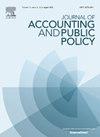公司声誉对自愿披露质量有影响吗?
IF 2.2
3区 管理学
Q1 BUSINESS, FINANCE
引用次数: 0
摘要
本研究探讨了公司声誉与自愿性信息披露质量之间的关系,后者由管理层盈利预测的发布和特点来体现。我们沿用了之前的文献,使用基于《财富》杂志 "美国最受赞赏公司 "榜单的衡量标准来代表公司声誉。我们发现,声誉较高的公司更有可能发布盈利预测,而且预测盈利的频率更高。在 "最受赞赏公司 "榜单上的公司中,我们还发现声誉较高的公司发布的盈利预测比声誉较低的公司发布的盈利预测更准确。敏感性分析表明,管理层预测行为的变化可归因于公司声誉的变化,而不太可能是管理能力变化的结果。我们的研究发现了促使公司披露更好的前瞻性信息的独特因素,从而为自愿性信息披露文献做出了贡献;我们的研究还证明了公司声誉对信息透明度的影响,从而为声誉文献做出了贡献。本文章由计算机程序翻译,如有差异,请以英文原文为准。
Does company reputation matter for voluntary disclosure quality? evidence from management earnings forecasts
This study explores the association between company reputation and voluntary disclosure quality as proxied by the issuance and characteristics of management earnings forecasts. We follow prior literature and proxy for company reputation using measures based on Fortune Magazine’s “America’s Most Admired Companies” List. We find that companies with higher reputations are more likely to issue earnings forecasts and forecast earnings more frequently. Among companies on the Most Admired List, we also find that earnings forecasts issued by higher-reputation companies are more accurate than those issued by lower-reputation companies. Sensitivity analyses show that the changes in management forecasting behaviors can be attributed to changes in company reputation and are unlikely to result from changes in managerial ability. Our study contributes to the voluntary disclosure literature by identifying a unique factor that motivates companies to disclose better forward-looking information and to the reputation literature by documenting that company reputation impacts information transparency.
求助全文
通过发布文献求助,成功后即可免费获取论文全文。
去求助
来源期刊

Journal of Accounting and Public Policy
Multiple-
CiteScore
4.80
自引率
2.80%
发文量
75
期刊介绍:
The Journal of Accounting and Public Policy publishes research papers focusing on the intersection between accounting and public policy. Preference is given to papers illuminating through theoretical or empirical analysis, the effects of accounting on public policy and vice-versa. Subjects treated in this journal include the interface of accounting with economics, political science, sociology, or law. The Journal includes a section entitled Accounting Letters. This section publishes short research articles that should not exceed approximately 3,000 words. The objective of this section is to facilitate the rapid dissemination of important accounting research. Accordingly, articles submitted to this section will be reviewed within fours weeks of receipt, revisions will be limited to one, and publication will occur within four months of acceptance.
 求助内容:
求助内容: 应助结果提醒方式:
应助结果提醒方式:


